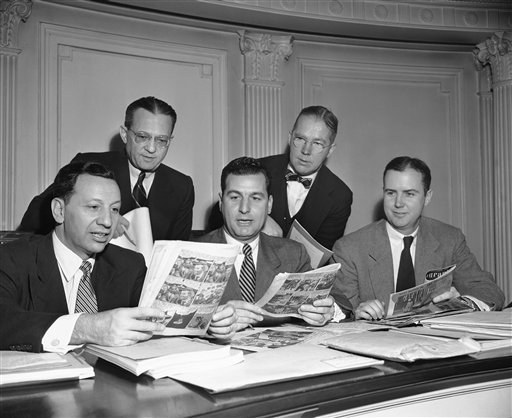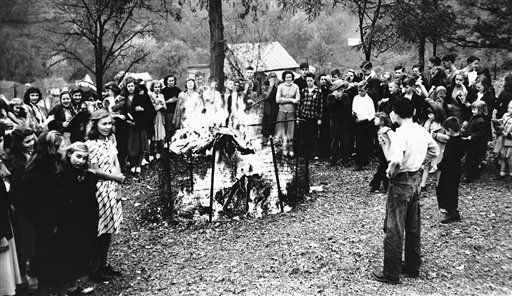The Comic Book Legal Defense Fund (CBLDF) is a New York based non-profit organization that was founded in New York in 1990 by Denis Kitchen.
The organization comes to the aid of comic book and graphic novel writers and sellers faced with prosecution. Such works, which sometimes feature sex and violence, link pictures with texts and often appeal to young readers.
Although such works have a long lineage, they have been a subject of popular concern at least since the 1950s when Dr. Fredric Wertham, a psychiatrist, concluded that such literature contributed to juvenile delinquency.
Courts have struck down regulations of comic books
Although Katzev v. County of Los Angeles (Cal. 1959) provides an example of a case where a Court struck down regulations of “crime” comics on the basis that such laws were overly broad, prosecutions have continued on other fronts.

Members of a joint legislative committee to study the publication of comic books look over some of the books under discussion at hearing in New York’s Bar Association Building on Dec. 4, 1951. Seated, left to right, are: State Senator Harold I. Panken of New York City; Assemblyman Joseph F. Carlino of Long Beach, N.Y., Committee chairman; and Assemblyman James A. Fitzpatrick of Plattsburg, N.Y. Standing, left to right; are: Reuben Lazarus of New York City, committee counsel, and Thomas A. Collins of Cold Spring, N.Y., legislative council to the committee. (AP Photo/Jacob Harris. Used with permission from The Associated Press.)
Since it was established, the CBLDF has provided expert witnesses and defended comic book authors against having to pay sales taxes that were not applied to other authors and against charges that comic books are pornographic or corrupted the young.
In a study of key cases that the organization has defended, Professor Marc H. Greenberg observes that, despite the organization’s help, some defendants accept plea deals rather than go through trials or retrials (2022/2012). Greenberg also documents how laws against obscenity are often vague and are sometimes enforced more severely on comic books than on other forms of literature.
John Vile is professor of political science and dean of the Honors College at Middle Tennessee State University. He is co-editor of the Encyclopedia of the First Amendment. This article was originally published in 2017.

